Sardines, also known as pilchards, refer to a type of fish that are high in omega-3 fatty acids. That alone makes them a welcome addition to our diets.
When raw, sardines are known for their trademark repugnant smell.
Generally, most marine organisms give out some form of unpleasant smell when exposed to air. That smell results typically from the reaction between their natural oils [which forms part of their defense mechanisms] and air.
But forget about the smell for now; sardines have been a delicious treat for humans from time immemorial. But can we say the same about our feline friends? Can cats eat sardines?
However, loving sardines is not such a big deal. The more pertinent question should be whether this fish can benefit your cat nutritionally. And whether there are potential dangers, especially if the cat eats beyond specified amounts.
So, are sardines safe for cats and what nutritional value can cats derive from this fish? The following sections shall expound further on that.
Table of Contents
Possible Health Benefits of Sardines to Your Cat
There are numerous ways your feline can benefit from a diet of pilchards. The following are some of them;
1. Rich Source of Proteins
Like most seafood, sardines are a rich source of proteins.
A single serving contains up to 20 grams of proteins. These proteins could benefit your cat in numerous ways, including promoting the development of their connective tissues and ensuring proper muscle functioning.
Proteins form the fundamental structures of your cat’s joints and bones, hair, skin and even nails. The best part is, there are certain amino acids in sardines that your cat cannot readily produce.
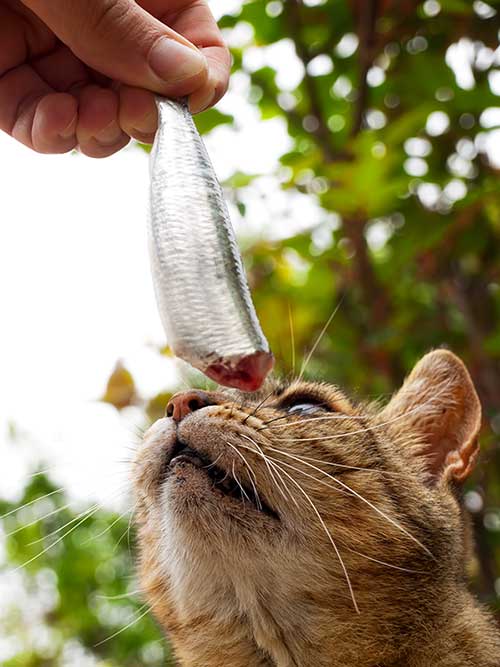
2. Improves Brain Health
Sardines are rich in Docosahexaenoic acid. DHA is a type of omega-3 fatty acid that forms the primary component of the brain, retina, and the skin.
A regular diet of sardines directly adds this fatty acid to your cat’s brain component. As a result, it promotes the cat’s cognitive health as well as prevent premature aging.
The cat will have improved eye function, better psychomotor skills, retentive memory, and remarkable learning abilities.
DHA also enhances motor skills, especially among kittens. Ultimately, a diet of sardines goes a long way in preventing brain damage and degeneration.
3. Relieves Allergies
Cats are known to exhibit some of the most severe allergic reactions among popular pets. And the causes of allergies in cats are quite many.
The most common form of cat allergies is known as atopy. Atopy refers to allergies that result from inhaling molds or pollen. If such foreign substances are introduced into their bodies, cats could scratch to death.
Other common allergic reactions in cats include nausea and vomiting, loss of appetite, diarrhea, and irritability. Thankfully, you can help your pet avert most of these sensitivities by offering it a diet of sardines.
Sardines also come with certain anti-inflammatory properties that reduce inflammations and irritations in the wake of an allergic reaction.
4. Strengthens Joints and Bones
Cats are some of the most active and playful pets. And that’s truer for kittens.
As a pet owner, you should be very concerned if you’re living with an idle and sluggish cat. But for your cat to live up to her playful nature, she’s got to have stronger muscles and bones. And that’s where sardines come in.
Sardines are packed with omega-3 fatty acids EPA as well as DHA; the very combination required for stronger and healthier joints. This seafood also packs vitamin D that directly promotes stronger bones.
- One (1) 14 lb. Bag - Purina Pro Plan High Protein Cat Food With Probiotics for Cats, Shredded Blend Chicken and Rice Formula
- High protein formula, with real chicken as the first ingredient. Fortified with guaranteed live probiotics to support digestive...
- Crunchy kibble and meaty, shredded pieces for a delicious mealtime experience. Used to be known as SAVOR Shredded Blend Chicken...
Last update on 2024-07-09 / Affiliate links / Images from Amazon Product Advertising API
5. Promotes a Healthier Heart
Heart and cardiovascular diseases are some of the most common health problems affecting cats. As such, felines require a diet rich in vitamin B12 to ensure a healthier cardiovascular system.
Sardines contain an abundance of this vitamin. A regular diet does not only prevent heart disease but also cures it.
6. Prevents Cancer
Cancer is a scourge for felines the same way it afflicts humans. And one way to avert or manage the condition is by adopting healthy dietary practices.
As we have already mentioned, sardines are rich in omega-3 fatty acids. These fatty acids are known for their outstanding abilities to inhibit the formation of malignant tumors.
In fact, sardines have been identified as one of the most common foods that help fight cancerous cells.
When the omega-3 fatty acids enter your cat’s system, they induce apoptosis. In lay terms, they kill the death of potentially malignant cells.
According to studies, sardines have shown exceptional abilities in fighting off or preventing skin cancer. That can also be attributed to their high concentration of vitamin D.
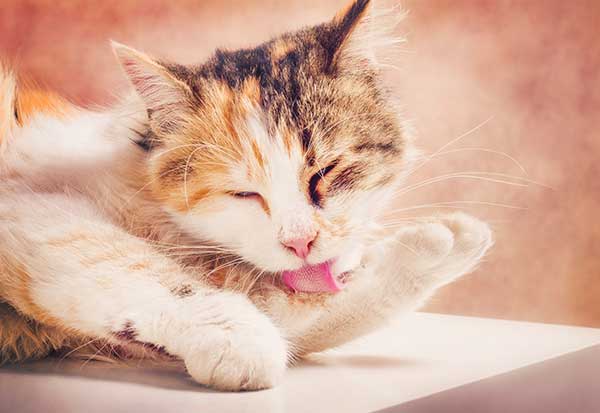
7. Promotes Positive Energy
Cats suffering from various forms of seizures can immensely benefit from a diet of sardines.
The omega-3 acids that sardines contain come with anti-inflammatory properties.
These anti-inflammatory abilities help fight off the inflammation mediators in epileptic cats. Besides, they increase seizure thresholds, thereby helping your cat manage the condition properly.
The EPA and DHA acids present in sardines are associated with mood improvement. Cats that suffer various forms of anxiety and depression, such as separation anxiety, can benefit from a diet rich in these compounds.
When the EPA derived from sardines interact with the cat’s system, they lower the cytokines that are associated with depression.
8. Weight Loss and Organ Improvement
As sardines contain a substantial amount of oils and fats, it would be logical to assume that they contribute to weight gain. But that’s not entirely true.
The omega-3 acids in sardines are known to activate various proteins that trigger the fat-burning genes in your cat’s body. Therefore, they ultimately promote a healthier and leaner cat.
Lastly, sardines improve the health of your feline’s vital organs, especially the kidneys. So, can cats with kidney disease eat sardines?
They sure can. The findings from most studies suggest that omega-3 fatty acids present in sardines could promote a healthier kidney. It notably averts the decline of kidney function, especially during the onset of kidney disease.
- Number 1 veterinarian-recommended cat probiotic brand to support digestive health (Kantar Veterinary Tracker, 2021), making it an...
- Purina Pro Plan Sensitive stomach cat food supplement for the dietary management of kittens and adult cats with cat diarrhea
- Digestive Care Cat Food supplement containing probiotics proven to promote intestinal health and balance
Last update on 2024-07-09 / Affiliate links / Images from Amazon Product Advertising API
What Kinds of Sardines Can Cats Eat?
Sardines come in various forms. But not all sardines are safe for your cat, especially if you buy them at your local supermarket.
That’s because they’re usually packed in different kinds of oils for taste enhancement and preservation purposes.
Some of these oils and foods include; olive oil, brine, tomato sauce, water, chilly, sunflower oil, and soybeans.
Let’s have a look at how each of these impacts your cat’s health.
Can cats eat sardines in sunflower oil?
In small amounts, sunflower oils are not toxic. Indeed, the oil can make your cat’s coat shinier and more radiant.
However, do not give your cat too many sardines in sunflower oil. Due to its laxative properties, sunflower oil could cause various side effects such as nausea, vomiting, and diarrhea. You might consider draining all the oil before offering the sardines to your cat.

Can cats eat sardines in soybean oil?
Soybean is one of the food substances that have been flagged as unsafe for cats. It comes with a host of dangers; ranging from thyroid damage to interference with a cat’s hormonal secretion activities.
Therefore, avoid serving your cat sardines in soy oil or soy brine. The only possible benefit of soy oil to your cat is that the oil is a natural and healthier replacement for fish oil.
What of tomato sauce, can cats eat sardines in tomato sauce?
Tomato sauce is spicy in nature. And as you probably already know, a cat’s digestive system is not developed to process spicy foods.
Therefore, offering sardines in tomato sauce to your furry friend is not an excellent idea. The onions and garlic often added to tomato sauce can only upset your cat’s gastrointestinal system.
If you must serve sardines in tomato sauce to your cute, little friend, be sure to rinse it properly in water. That will help reduce the toxic levels of the spices in the sauce.
Can you feed cats sardines in olive oil?
Olive oil is a welcome addition to the diets of most pets. The oil packs immense skin-nourishing benefits and could add an extra layer of radiance and brightness to your cat’s coat.
Olive oil also comes with remarkable health benefits to a cat’s digestive system. It’s a potent cure for hairballs.
Therefore, your cat will benefit a lot from sardines served in olive oil. The only precaution is to offer the oil to your cat in moderation. In large quantities, olive oil could lead to vomiting and diarrhea.
- Real turkey is the number 1 ingredient in this Purina indoor cat food to help provide the protein she needs for strong muscles,...
- High protein cat food kibble with 10 percent less fat than Purina ONE Tender Selects Blend With Real Chicken helps her maintain a...
- A SmartBlend of fiber-rich nutrition in weight control dry cat food helps minimize hairballs, and four antioxidant sources support...
Last update on 2024-07-09 / Affiliate links / Images from Amazon Product Advertising API
Can cats eat sardines in brine?
Simply put, brine refers to a high concentration of salt in water. Brine is a popular preservative; hence, it’s not uncommon to bump into foods that are canned in brine.
But never feed sardines in brine to your cat. The consumption of foods preserved in brine may lead to sodium ion poisoning. And the effects could be devastating to your furry friend.
Some of the symptoms of sodium ion poisoning include nausea and vomiting, diarrhea, loss of appetite, tremors and seizures, elevated body temperatures and depression. If not attended to with the urgency it deserves, sodium ion poisoning could even lead to death.
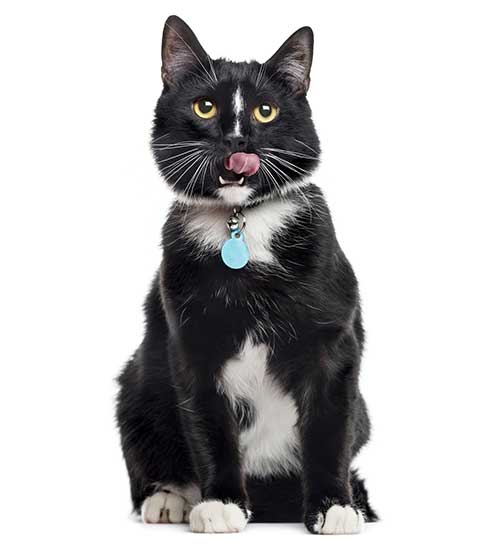
Finally, can cats eat sardines in water?
If you must go for canned sardines, insist on those preserved in water with no seasoning, salt or spices added to it. We have already highlighted various oils that are generally considered healthy for cats.
You may be tempted to buy sardines preserved in these oils, believing your cat will enjoy even greater nutritional benefits. However, that’s not always the case.
Remember that before sardines are canned, they undergo rigorous processing for preservation and taste enhancement purposes. During these processes, many additives, spices, and condiments are incorporated.
So, while you might think you’re doing justice to your cat by serving it what appears to be nutritionally-rich sardines, you could actually be exposing the life of your furry companion to greater danger.
- INTERACTIVE TOY FOR CURIOUS CATS – Cat Amazing’s Shark Tank-famous & award-winning puzzle box is designed to stimulate and...
- ENCOURAGES NATURAL INSTINCTS – Stimulate your cat's natural foraging instincts to explore, scratch, sniff and retrieve hidden...
- STRESS AND BOREDOM BUSTER – Our puzzle cat toy is sure to pique your cat’s curiosity as it works with their favorite treats,...
Last update on 2024-07-09 / Affiliate links / Images from Amazon Product Advertising API
Canned, Raw, or Cooked Sardines? Which One Is Best?
Obviously, sardines are best served cooked as opposed to canned or offered raw. However, you may not always have access to fresh sardines that you can prepare yourself.
In any case, it’s generally easier to find canned sardines in supermarkets than fresh ones in open-air markets.
As we have mentioned, canned sardines are not very dangerous as long as you carefully choose the substance in which they are canned.
Canned sardines come with even more potential risks for your cat, including thiamine poisoning, fat gain, and poisoning from heavy metals such as mercury.
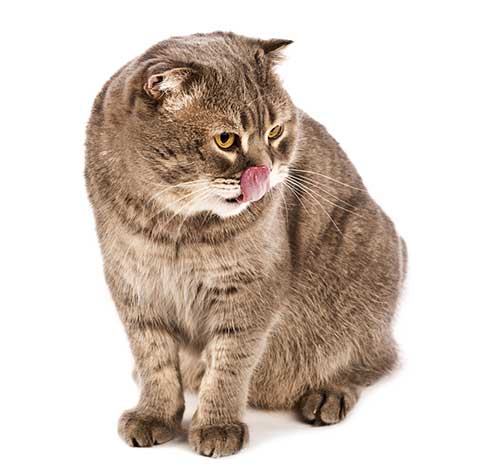
As a pet owner, you may be tempted to serve raw sardines to your cat. That could be motivated by the notion that fresh sardines contain an abundance of mineral elements than cooked ones.
Well, there is some truth to that. However, your cat requires only small amounts of these essential minerals.
In excess, these minerals could be counterproductive to your feline’s overall wellbeing. Plus, raw fish comes with a host of dangers. Therefore, the safer option is to give cooked sardines to your cat, as opposed to raw or canned ones.
Cooking is generally encouraged as it helps eliminate the risks of poisoning from the heavy metals present in sardines. It also kills potentially harmful bacteria such as salmonella.
But when it comes to cooking sardines, there are various methods. Some of these include steaming, boiling, smoking, or even grilling. Which begs the question, can cats eat smoked sardines?
Smoked fish contains high amounts of salt which we have already identified to be very poisonous for cats. Generally, avoid any cooking method that requires the sardines to be cured in salt or bathed in oil.
What of bones, are they a choking hazard?
Not really. Sardine bones are relatively small and soft, so most adult cats will effectively deal with them.
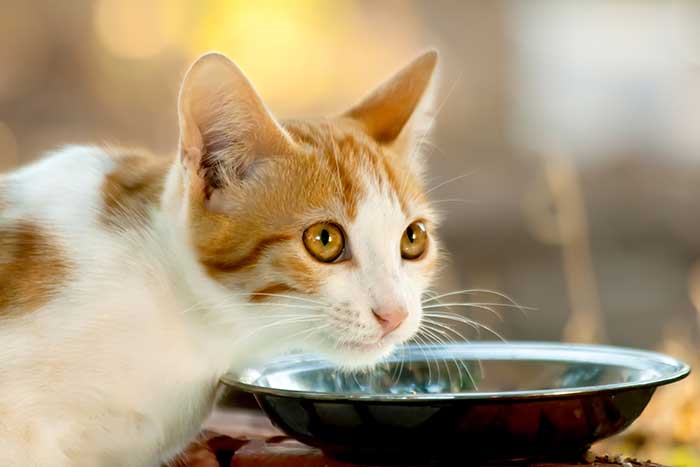
What Are The Recommended Portions?
It’s important to understand how many sardines your cat requires and what portions are considered too many. So, you may be wondering, how much sardine is enough for my cat?
If going for canned sardines, half of the can is sufficient for the cat. But how often can cats eat sardines?
The frequency should be once or twice a month for that portion. Also remember that a 3.75-ounce can contains up to 200 calories. So whenever you feed canned sardines to your cat, reduce the number of any other high-calorie foods.
If you have pre-cooked sardines at home, you require only one sardine per day to supply your cat’s nutritional needs. The keyword here is moderation. So, instead of making it a staple component of your cat’s diet, only offer sardines to your little furball as a treat.
You might also be wondering how to feed cats sardines and the reactions to watch out for. Again, introduce small amounts of sardines to your cat’s diet and watch out for any unusual signs.
Some of these signs include diarrhea, vomiting, gassiness, and bloating. If you spot any of these signs and depending on the severity, withdraw sardines from your cat’s diet straight away and consult your vet. Another thing to watch out for is addiction.
- Works as a dog food topper - For pet parents looking for an alternative to capsules, raw treats, or soft chews, all it takes is a...
- A tasty & body nourishing treat for cats & dogs - Essential fatty acids for a healthy coat.
- Powerful Omega Fatty Acids - This premium fish oil liquid formula is loaded with the healthy Omega-3 fatty acid (with epa and dha)...
Last update on 2024-07-08 / Affiliate links / Images from Amazon Product Advertising API
Conclusion: So, are sardines good for cats?
Yes. Sardines contain lots of nutritional elements that your cat may find useful.
However, it is also a very high-calorie fish and is especially discouraged for cats battling with weight issues. Therefore, only offer sardines to your cat as an occasional treat.
Checkout Our Favorite Cat Products
1. Best Online Course For Cat Parents
Our favorite: The Cat Language Bible (How to Finally Understand And Speak to Your Cat) – A new form of cat to human communication that many cat owners have dreamed about… but few have actually thought possible.
2. Best Immune Support For Cats
Our favorite: Tomlyn Immune Support – Best Supplement for Cats and Kittens.
3. Best Cat Treats
Our favorites: LIFE ESSENTIALS All Natural Freeze Dried Chicken And Sheba Meaty Tender Sticks – Both are Great.








